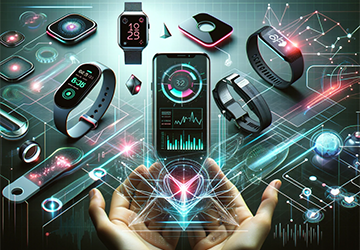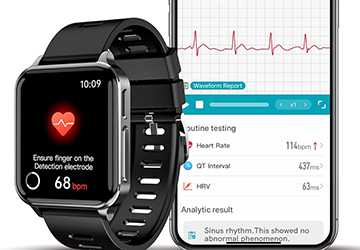The Transformative Power of Smart Wearables in Personal Health Monitoring
In recent years, intelligent wearables have transformed the technology landscape, providing avant-garde solutions for all aspects of life. One of the most transformative applications of these devices is personal health monitoring. By seamlessly blending technology and healthcare, smart wearables are revolutionizing how we check and manage our health. This article explains the impact of wearables in health monitoring, highlights trends in intelligent health devices, and explores the future of personal health technology.

The Rise of Wearables in Health Monitoring
Improving Everyday Health Monitoring
Wearables in health monitoring have become a must-have for individuals who want to maintain a healthy lifestyle. These devices meticulously track a range of physiological measurements, such as:
- Heart rate
- Nighttime rest patterns
- Physical exertion
- Oxygen saturation in the blood
Wearable health monitoring devices enable users to make informed decisions about their health by providing real-time data. This continuous health monitoring can intelligently detect potential health anomalies and intervene promptly.
Chronic Disease Treatment
Chronic diseases such as diabetes and hypertension require continuous monitoring. Wearable health monitoring devices provide an effective way to monitor vital signs and treat these diseases. For example, wearable blood glucose monitors can provide continuous blood sugar readings and help people with diabetes maintain optimal blood sugar indexes.
Mental Health Monitoring
In addition to physical health, wearable health monitoring devices have also made great strides in mental health. Devices with sensors can monitor stress levels and mood changes and can even detect early signs of depression. This holistic approach to health monitoring ensures that human and mental health are considered.
Smart Health Device Trends
Advanced Sensor Technology
A key trend in smart health devices is the advancement of sensor technology. Modern wearable devices have sensitive sensors that can detect tiny physiological fluctuations. These sensors provide precise data, improving their reliability in health monitoring.
Integration with Artificial Intelligence
Another notable trend is integrating artificial intelligence (AI) into intelligent medical devices. AI algorithms carefully analyze the data collected by wearable devices and provide tailored health insights and recommendations. This thoughtful analysis can help users better understand their health and take proactive measures.
Wearables for Specific Health Conditions
The market is witnessing the rise of intelligent health devices designed for specific medical conditions. For example, portable electrocardiogram monitors are suitable for heart patients, while devices with fall-detection capabilities are suitable for the elderly. These specialized wearables address unique healthcare needs and make healthcare more personalized and efficient.
The Future of Personal Health Technology
Predictive Health Monitoring
The future of personal health technology lies in predictive health monitoring. By analyzing historical health data, intelligent wearables can predict potential health conditions before they occur. This proactive approach will revolutionize preventive healthcare, reduce the burden on healthcare systems, and improve overall health outcomes.
Integration with Healthcare Systems
Integration with healthcare systems is critical for health monitoring wearables to reach their full potential. Future smart healthcare devices will seamlessly share data with providers, enabling continuous monitoring and timely intervention. This symbiosis between technology and healthcare will lead to more efficient and effective patient care.
Improving User Experience
The future of personal health technology is also expected to expand the user experience. Wearables are becoming more comfortable, stylish, and user-friendly. Innovations in battery life and water resistance will make these devices more suitable for daily use. In addition, advances in privacy and security will protect users' health information.
Biometric Authentication
Health monitoring wearables now integrate biometric authentication for increased security. These intelligent health devices utilize skin edge analysis and facial topology detection to ensure that only authorized users can access sensitive health data.
Real-Time Telemetry
A critical development in smart health devices is the ability to provide real-time telemetry; this allows health data to be transmitted to medical staff uninterruptedly and enables immediate intervention in emergencies.
Versatility
Modern smart wearables are designed to be multifunctional, integrating various health monitoring functions into a single device. For example, a smartwatch can combine heart rhythm monitoring, electrocardiogram, blood oxygen saturation, and sleepiness analysis.

Advantages of Intelligent Wearables in Health Monitoring
Personalized Health Insights
Wearables in health monitoring provide personalized health insights based on individual needs. These devices can analyze data trends and provide actionable recommendations to help users achieve their health goals.
Empowering Users
Smart health devices enable users to take charge of their health. With access to real-time health data, individuals can make informed decisions about their lifestyle and healthcare. This empowerment can lead to better health outcomes and a higher quality of life.
Reducing Healthcare Costs
Wearables in health monitoring can significantly reduce healthcare costs by promoting preventive healthcare. Early detection and treatment of health issues can avoid expensive medical interventions benefiting individuals and health systems.
Challenges and Considerations
Data Accuracy
Despite the many advantages of wearable devices for health monitoring, data accuracy still needs to be addressed. Ensuring these devices provide reliable and accurate readings is critical to their effectiveness.
Privacy and Security
The collection and storage of health data raises privacy and security concerns. Innovative health device manufacturers must prioritize data protection to gain user trust and comply with regulations.
Accessibility
Another challenge is making smart wearable devices accessible to everyone. Efforts should be made to ensure that people from all socioeconomic backgrounds can afford and use these devices.
Ethical Considerations
Data Protection and Consent
Since wearable devices collect sensitive health data when monitoring health conditions, it is critical to ensure data privacy and obtain informed consent from users. Ethical frameworks and regulatory standards must be established to protect user rights and maintain trust in intelligent health devices.
Eliminating Bias in Healthcare Algorithms
Algorithms used in smart health devices must be developed to avoid bias and ensure that all users are treated fairly. This includes testing algorithms on different populations and continuously improving them to reduce emerging biases.
Ensuring Accessibility and Inclusion
To maximize the benefits of intelligent wearable devices, efforts must be made to ensure their accessibility and inclusion. This includes developing devices that meet different needs and abilities and are affordable to multiple socioeconomic groups.
Conclusion
Smart wearable devices are revolutionizing personal health monitoring and providing innovative health monitoring and management solutions. By tracking smart health device trends and looking ahead to the future of personal health technology, we can expect a healthcare landscape where technology and healthcare merge seamlessly. As we take advantage of these advances, we must address challenges and ensure everyone can enjoy the benefits of smart wearables.